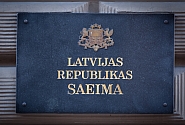
Necessary preparations have been made in the parliament for the planned Saeima sitting of 2 April to take place as a video conference, with MPs staying in different premises of the parliament building. This will be a temporary solution in order to ensure that plenary sittings are held in line with the procedures laid down in the Rules of Procedure of the Saeima.
At the same time, intensive work has begun to make a new technological platform available as soon as possible in order to enable Saeima sittings to be held remotely during a state of emergency, with MPs remaining outside the Saeima premises.
Due to the need to keep the physical distance, the plenaries will henceforth be organised with MPs working not all together in the Plenary Chamber, but in eight separate parliamentary premises fitted with conference equipment. During the plenary, the Speaker of the Saeima will be in the Plenary Chamber, while MPs will work in separate rooms by parliamentary groups. A separate room is provided for unaffiliated members.
Parliamentarians will be able to take the floor and adopt decisions by voting. Each room will also have tellers delegated by parliamentary groups and unaffiliated members.
The plenary sitting, also when organised in this temporary format, is to be broadcast live on the Saeima website, so that the public and media representatives can follow the work of the legislature as usual.
As of now, Saeima committees have an option to hold their meetings remotely on a video conferencing platform, with MPs remaining outside the Saeima facilities. Committee staff are being swiftly trained to work in this manner, and several committee meetings have already taken place in this format, with necessary decisions made and votes cast during these meetings. Using a video conferencing platform, sittings of the Saeima Presidium are also held remotely.
In addition, active work is under way to develop, as soon as possible, a new technological solution for remote work tailored to parliamentary activities and specific procedures. This will enable lawmaking to continue during the state of emergency, without MPs entering the premises of the Saeima. The technological solution of the e-Saeima, among other things, will have to ensure a way for MPs to authenticate themselves, request the floor, moderate debates, and vote securely. Importantly, the new solution will also have to make Saeima sittings accessible to the general public by providing a live broadcast.
A number of leading information and communication technology companies have been approached for the development of this solution, and more than ten relevant proposals have already been received. They are currently being evaluated.
Due to the special regulation of parliamentary activity, the transition to remote work is technologically and procedurally complicated. For this reason, we call for understanding in case the traditional parliamentary procedures in remote mode do not go as smoothly as usual.
The work of the Saeima is now organised taking into account the restrictions set under the state of emergency declared in the country and the recommendations of epidemiologists. For example, members of the public are asked to strictly keep a distance of two meters, to wash and disinfect their hands frequently and thoroughly, and to take other precautions. Relevant informative guidelines are placed in the Saeima. Hand disinfectants and wipes, gloves and drinking water will also be available in the rooms where MPs will be staying.
Attention media representatives:
Taking into account the current situation with the spread of COVID-19 and the restrictions set in the country, please bear with the fact that the plenary sitting will be available for the media only remotely. As usual, the live broadcast of the sitting will be provided on the Saeima website. This is a necessary precaution during the state of emergency to minimise the risk of COVID-19 spreading.
Due to the need to keep the necessary physical distance between people during the state of emergency, members of the Saeima and its employees will be able to use the parliamentary premises on the day of the plenary sitting. Media representatives are invited to contact MPs, if necessary, using IT solutions.
Saeima Press Service







